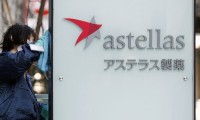-
FDA signs off on new uses for Astellas and Pfizer’s Xtandi, Merck’s Keytruda
- Source: drugdu
- 117
- November 21, 2023
-
Apellis parries Astellas’ long-term Izervay data with 3-year results on its rival GA med Syfovre
- Source: drugdu
- 112
- November 8, 2023
-
Seagen and Astellas’ Padcev, in Keytruda combo, delivers ‘practice-changing’ bladder cancer win
- Source: drugdu
- 108
- October 4, 2023
-
Astellas withdraws IRA lawsuit after avoiding CMS’ price negotiations list
- Source: drugdu
- 189
- September 8, 2023
-
Astellas invests $50m to support advancement of Poseida’s cancer cell therapy
- Source: drugdu
- 113
- August 11, 2023
-
Iveric Gets FDA Approval in Geographic Atrophy After Being Acquired by Astellas
- Source: drugdu
- 209
- August 9, 2023
-
Astellas Strikes Another Deal to Expand in Cancer, Partnering With PeptiDream
- Source: drugdu
- 115
- July 27, 2023
-
J&J, Astellas Join Pharma Lawsuits Over Medicare Drug Price Negotiations
- Source: drugdu
- 104
- July 21, 2023
-
Astellas Gains FDA Priority Review for Gastric Cancer Therapy BLA
- Source: drugdu
- 121
- July 11, 2023
-
With Iveric Bio buyout, Astellas CEO Naoki Okamura acted on the company’s mantra to be ‘aggressive’
- Source: drugdu
- 113
- June 15, 2023
your submission has already been received.
OK
Subscribe
Please enter a valid Email address!
Submit
The most relevant industry news & insight will be sent to you every two weeks.













